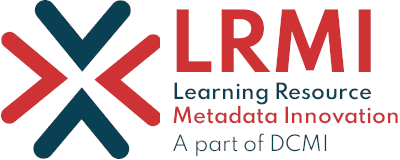Learning Resource Type Vocabulary Draft

The Dublin Core task group on Learning Resource Metadata (LRMI) wishes to receive comments on a new high-level vocabulary for categorizing Learning Resources by type.
The LRMI specification is a collection of classes, properties and concept schemes for markup and description of educational resources. These classes, properties and concept schemes have always been developed in the knowledge that other metadata standards exist, and the aim of LRMI has always been to supplement existing standards with terms that are specific to learning, education and training. So, LRMI properties and classes are complementary to those in Dublin Core Terms, and have been adopted by schema.org, allowing learning resources to be described fully and consistently with either standard.
The new concept scheme for Learning Resource Types continues this tradition of seeking to complement existing general purpose standards. It deals only with conceptual categories for the kind of resource that something is, that is the form or genre of a resource, not the medium of transmission, not the media type and not the encoding format of a resource. Furthermore, it deals only with types for resources that are explicit in their intention to be applicable to learning, education and training, thus supplementing other existing vocabularies for form and genre such as the form and genre terms from the Library of Congress. As it is our experience that more specialized categories tend to be less consistently understood, we provide a small set of broad categories. Where more specialized terms are required, we encourage implementers to declare these terms in RDF and to publish them with a relationship, such as skos:broadMatch, to indicate the most relevant LRMI Learning Resource Type. We, in turn, have published the Learning Resource Type vocabulary as a SKOS Concept Scheme with declared links to the Library of Congress vocabulary for form and genre and to the CEDS vocabulary for Learning Resource Types.
The new LRMI Learning Resource Type vocabulary is published as a public draft for comment at https://www.dublincore.org/specifications/lrmi/concept_schemes/learningResourceType/. We welcome comments, questions and suggestions on the coverage, the definitions of the concepts and other aspects of the scheme. Please comment before May 30, 2022, by email to the LRMI task group maillist [email protected] or by raising an issue on our github repository, https://github.com/dcmi/lrmi/issues. Please note that all comments will form part of the public record of the development of this vocabulary.
Phil Baker, Chair, LRMI Task Group
Links and Further Information
- DCMI
- The Dublin Core™ Metadata Initiative is an organization supporting innovation in metadata design and best practices across the metadata ecology, see https://www.dublincore.org/about/
- LRMI™
- is a task group of DCMI, see https://www.dublincore.org/groups/lrmi-task-group/
- schema.org
- is a collaborative, community activity with a mission to create, maintain, and promote schemas for structured data on the Internet, on web pages, in email messages, and beyond, see https://schema.org/
- LCGFT
- The Library of Congress Genre/Form Terms for Library and Archival Materials (LCGFT) is a thesaurus that describes what a work is versus what it is about, see https://id.loc.gov/authorities/genreForms.html
- CEDS
- The Common Education Data Standards Initiative is an education data management initiative whose purpose is the streamline the understanding of data within and across P-20W institutions and sectors, see https://ceds.ed.gov/whatIsCEDS.aspx
- CEDS Learning Resource Types
- are enumerated at https://ceds.ed.gov/element/000928/
- SKOS
- Simple Knowledge Organization System is an area of work of the W3C developing specifications and standards to support the use of knowledge organization systems (KOS) such as thesauri, classification schemes, subject heading lists and taxonomies within the framework of the Semantic Web, see https://www.w3.org/2004/02/skos/
